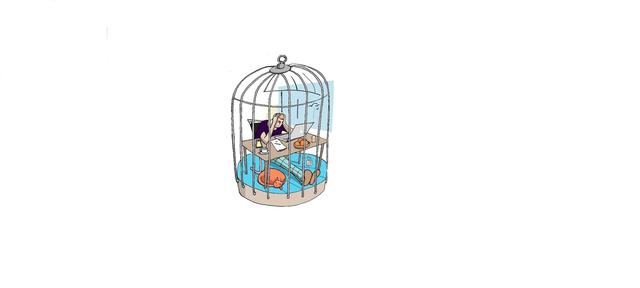It is time to recognize that health choices constitute conditions of psychological mistreatment for many citizens
A carte blanche from Clémentine Ronse, clinical psychologist at the Mental Health Service of Wavre, on behalf of several colleagues (see below)
As mental health professionals, we are sounding the alarm: the health measures imposed on the population are having catastrophic effects on the psychological balance of citizens, which will have long-term repercussions, and even, in some of the most tragic situations, over several generations.
Prohibit living to avoid dying
More social or professional relationships, more solidarity, more informality, more art, more ties: in the name of "health", the ongoing health crisis and the way it is treated today reduces people to production units devoid of needs that are nevertheless their humanity. A sterilized society, without contacts, ready to sacrifice entire generations to avoid coming to terms with the inevitable reality of death. Prohibiting life to avoid dying, here is a postulate that has its limits, especially in the long term.
The psychoanalyst René Spitz was able to show how infants placed in orphanages, despite being fed and washed, literally let themselves die for lack of affection and warm physical contact. Man is a being of contact who is built from an early age in the relationship with others, play, imagination.
An explosion of requests for help
As mental health professionals, we are alarmed today by the intensity and multiplicity of mental disorders, signs of real psychological distress , which people of all ages and backgrounds develop today. We have to deal with an explosion of requests for help which increasingly take the form of a desperate appeal. People, young and old, deprived of their sometimes already very precarious resources, come to bring their suffering to us with an unprecedented intensity. Our agendas are overflowing and therapists, deprived themselves of some of their resources (therapists need connections, informality and possibilities of decompression as much as their patients), exhaust themselves trying to keep afloat at all costs. a sinking ship. Not to mention that certain therapeutic support methods, although very promising, are no longer usable at present: all group activities for example (talk groups, reception areas for toddlers with their parents, therapeutic workshops for several, and others), are deleted.
The pressure is intense and close to unbearable!

The catastrophic situation of adolescents and children
We are finally starting to talk about our desperate youth, feeling left to their own devices, without a future, deprived of their capacity for revolt and outlets (deprivation of outings, activities, sports, access to stable education, ban on demonstrations, etc. etc.), which can only implode through worrying symptoms. Dropping out of school, school phobias, depression, anxieties, suicide attempts, scarifications, addictions, so many "swear words" that make up the daily lives of teenagers today. Can we decently ask a teenager to assume his learning independently through a screen sometimes no bigger than that of a smartphone? What about those who do not even have access to an internet connection? Adolescence is a fragile and complex period, made up of significant changes in identity, where relationships with peers are crucial. Teenagers without connections, activities and prospects for the future are unable to build themselves solidly. The parents, themselves weakened, do not always have the capacity to support these young people who sometimes seem to wander without a net to cling to.
But let's not forget the youngest who are also exposed to the anguish and dehumanization of a society in the throes of unraveling, deprived of its rituals which structure it and give it meaning (weddings, funerals, birthdays, religious holidays, family reunions, etc., all these great life events are practically erased from our existence), and the spontaneity that a child needs to grow. Protocols, social bubbles, barrier gestures, masks, prohibition of contact, will leave a lasting mark in the identity construction of our children. Our therapeutic consultations with them, a space a priori dedicated to the expression of intimacy, play and imagination, are flooded with representations of “Covid” in all possible forms. The coronavirus is omnipresent and obstructs the thinking of many of our little consultants.
We are worried about the mental health of the children, and about their future: we observe a multitude of symptoms which, by their form or their intensity, are the indicators of significant suffering, sometimes invisible at first sight. Very young children are exposed to screens for hours on end, with no parental relay possible when parents are teleworking, or overwhelmed by their own difficulties - further increased by the current context. Young children are suddenly cut off from some of their affective relationships (grandparents, godparents, resource person, etc.), without their having the ability to understand the meaning. Parental conflict and explosive separations are on the rise. Children are asked to learn at home and by themselves what some parents are not able to teach them, for lack of sufficient personal schooling. School phobias and learning disorders, sleep and eating disorders, outbursts of violence, regressions that can go as far as autistic-type symptoms (stereotyped and repetitive behaviors, silence), we cannot mention here all the forms that the distress of the youngest is currently taking.
We also know to what extent closed systems, closed in on themselves, are sources of violence, even psychological, bodily and/or sexual abuse. It is in the name of the protection of a society that we impose on it all the conditions favorable to the mistreatment of its members.
Isolation leads to self-depreciation
While we have focused on the effect of health measures on young people, we are making the same observation on the side of adults who are increasing their calls help and are no longer able to maintain their own psychological balance. Isolation leads to a feeling of uselessness and self-depreciation, a melting pot of various psychic decompensations. Here again, our consultations are overflowing with people in enormous suffering, who are breaking down through the consumption of alcohol and drugs, violence, suicidal acts, depression, etc. When we know that trauma can have deleterious effects on at least three generations, we can only be alarmed by the current situation and the dramas that have been playing out on a daily basis for more than a year already.
Let's talk about the most fragile people, in very precarious situations, whose hook with our service was already hanging by a thread before the health crisis: we no longer hear about some of them and this silence worries us. In what state will we find them in the end…? And can we ignore the distress of families who have seen one of their elders, confined in a home for months without any human contact, wither away, not from the coronavirus, but from sadness and loneliness?
Finally, as mental health professionals, we are uncomfortable with speeches that tell us: "we understand that it is not easy, but we still have to make an effort": it is time to recognize that the choices that have been made to deal with the pandemic constitute conditions of psychological mistreatment for citizens and cause them to live an experience of dehumanization that will have long-term effects, as social relations are in the process of s lasting way, so many people are falling into precariousness while being told that they are not "essential", so much the gaps are widening at the economic, educational and social level, so much our democratic capacities are reduced to nil, as well as those of making the choice, for oneself, to come to terms with the question of the risks inherent in being alive.
The human being is not just a set of quantifiable and medicalizable parameters; devoid of its creativity, its relationships and all the “interstices” that make up its humanity, it withers away.
Signatories
Claire Delforge, clinical psychologist
Elise Merten, clinical psychologist
Katia Winnykamien, psychosocial support worker and occupational therapist
Elodie Querton, sexologist and clinical criminologist
Adélie Genot, psychosocial support worker







